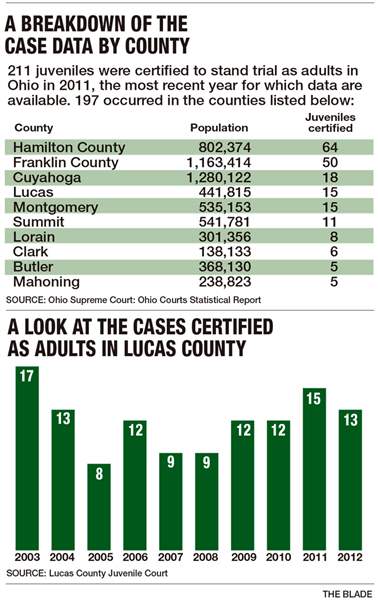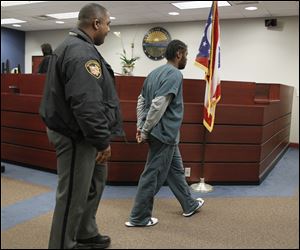
JUVENILE JUSTICE SYSTEM
More youths certified to stand trial as adults
Gun use among teens on rise, officials say
5/13/2013
THE BLADE
Buy This Image

At a certification hearing earlier this year for 16-year-old Titus Crittendon, who faced two counts of felonious assault, she said the teen seemed almost unconcerned with what he’d been accused of. “If you watch the video of his statement, there is no effect,” said Lori Olender, deputy chief of the juvenile division of the Lucas County Prosecutor’s Office. He is to be sentenced Wednesday.
As recently as two years ago, most of the youths facing criminal charges serious enough for them to be tried as adults weren’t using guns. Some were breaking into homes; others were committing robberies, but guns were rarely drawn.
In 2012, 11 of the 13 juveniles who were certified to stand trial as adults in Lucas County used a firearm in the commission of their crime, court records show.
“It’s become such a public safety issue that juveniles are more often than not, on violent crimes, coming in with guns being involved,” said Lori Olender, deputy chief of the juvenile division of the Lucas County Prosecutor’s Office.
“The guns are becoming too easy for juveniles to possess. It’s too easy for them to obtain weapons.”
What worries her the most, she said, is that youths don’t seem to understand how deadly they are.
“I think they start to become numb to what it really means to have that gun,” Ms. Olender said.
At a certification hearing earlier this year for 16-year-old Titus Crittendon, who faced two counts of felonious assault, she said the teen seemed almost unconcerned with what he’d been accused of.
“If you watch the video of his statement, there is no effect,” Ms. Olender said.
“He shot somebody, and then he shot at a police officer, and he’s sitting there going, ‘You think I’m going to jail?’ ”
Crittendon pleaded no contest to the charges and a firearms specification last month in Lucas County Common Pleas Court. He is to be sentenced Wednesday.
Judge Connie Zemmelman of Lucas County Juvenile Court said she has asked youths who come before her court where they got their gun.
“Down the street,” is a typical response, she said.
“It’s alarming to me how accessible guns are out there,” she said. “It’s ridiculous. It’s really ridiculous, but that’s a national issue that needs to be changed and addressed.”

Whether the gunfire is on their televisions, their computers, or in their neighborhoods, Judge Zemmelman said it’s become so commonplace for some youths, they seem unfazed by it.
“It’s a culture these kids are growing up in,” she said. “That’s what’s so scary and so sad. They don’t think about carrying a gun because they see it all the time.”
Ms. Olender, who took over the juvenile division in 2007, said it’s her policy to seek certification to the adult system for all juveniles who shoot somebody, period. Some are mandatory certifications and some are not.
Last year, the cases included young men such as Davion Wilson, 17, who was sent to prison April 29 for 15 years for his part in the shooting death of a 17-year-old and the wounding of a 16-year-old.
Jacob Rodriguez, just 16, received a 13-year sentence in September for his role in the fatal shooting of a Toledo man.
One youth, whose case reverted to juvenile court after the charge was reduced in Common Pleas Court, used a gun to take a bus pass from another youth, Ms. Olender said. The list goes on.
Toledo defense lawyer Jerome Phillips said youths who come to court have different attitudes than he once saw. “It’s almost a badge of courage to shoot someone and go to prison,” he said.
Said another defense attorney, “It’s not necessarily a badge of honor but a way of life that in some corners is accepted and respected.”
One thing is certain, officials say: once youths wind up in the adult system, their chances of rehabilitation become even slimmer and the sentence undoubtedly longer.
“You’re putting these kids in an adult prison and then they have no chance. It’s over with,” Mr. Phillips said.
A national movement looks to reducing juvenile certifications. Some proponents argue that prosecuting youths as adults hurts the teens and ultimately hurts, not protects, public safety.
According to the Children’s Law Center Inc., a legal-advocacy organization for children in Ohio and Kentucky, national statistics show youths prosecuted in the adult system are more likely to commit crimes after they’re released from prison than teens who stay in the juvenile system. Youths are more likely to commit suicide and are at greater risk for sexual assault in an adult lock-up than in a juvenile detention center, data show, and youths of color are much more likely to be prosecuted as adults.
Ms. Olender said she does not relish asking the court to certify juveniles to the adult system, but some have exhausted all options available to the court. Others commit a crime so severe it must, by law, be transferred to the adult system.
“They have enough homegrown adults across the street for us to be throwing our cases at them too,” she said.
Judge Zemmelman said the court decides discretionary certifications — those not considered mandatory by law — based on a number of factors individual to each case: the child’s mental health, circumstances at home, school reports, age, and delinquency history, among others.
She said the court looks at whether the individual would benefit from the programs and services the court offers, including a stay at the Lucas County Youth Treatment Center, a locked-down facility that combines programs and school.
“It’s really about, is there enough time to rehabilitate a child within the [juvenile] system and is there a level of security available in the juvenile system to provide reasonable assurance of public safety?” Judge Zemmelman said.
Coming up, two 17-year-old Toledo boys — Levi Jackson and Cody Ramsay — are expected to be certified to stand trial as adults on murder charges related to the April 29 shooting death of Nathaniel Phillips, 21. Their cases are mandatory certifications, Ms. Olender said, because of their age, the charges, and that a gun was used.
Contact Jennifer Feehan at: jfeehan@theblade.com or 419-213-2134.